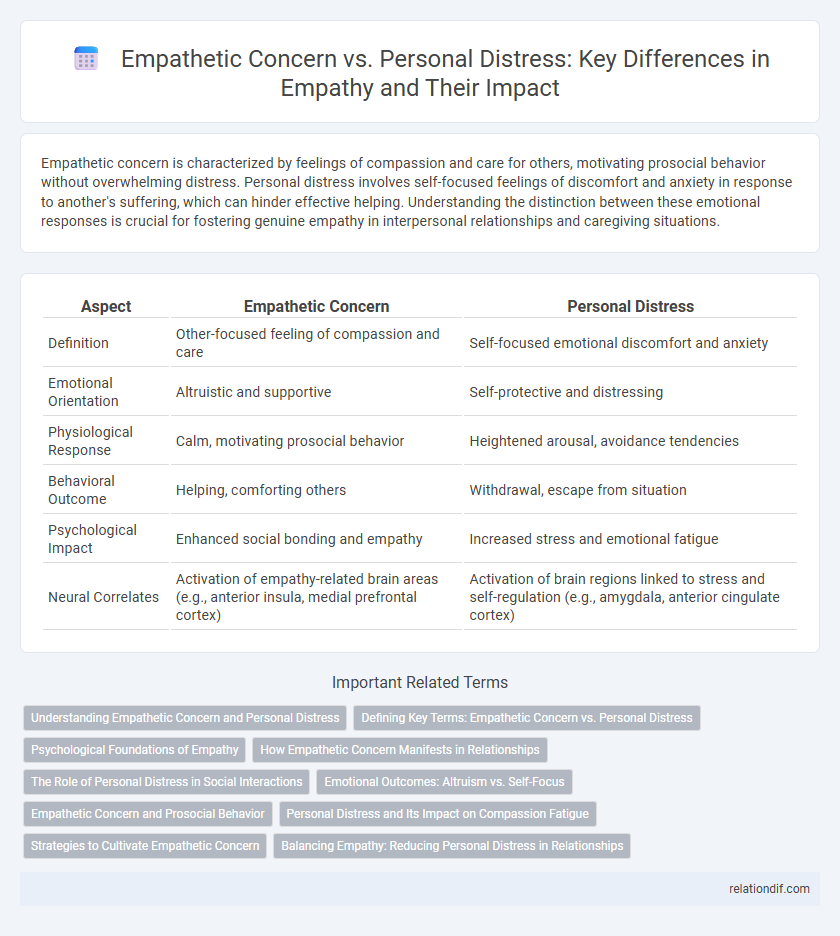Empathetic concern is characterized by feelings of compassion and care for others, motivating prosocial behavior without overwhelming distress. Personal distress involves self-focused feelings of discomfort and anxiety in response to another's suffering, which can hinder effective helping. Understanding the distinction between these emotional responses is crucial for fostering genuine empathy in interpersonal relationships and caregiving situations.
Table of Comparison
| Aspect | Empathetic Concern | Personal Distress |
|---|---|---|
| Definition | Other-focused feeling of compassion and care | Self-focused emotional discomfort and anxiety |
| Emotional Orientation | Altruistic and supportive | Self-protective and distressing |
| Physiological Response | Calm, motivating prosocial behavior | Heightened arousal, avoidance tendencies |
| Behavioral Outcome | Helping, comforting others | Withdrawal, escape from situation |
| Psychological Impact | Enhanced social bonding and empathy | Increased stress and emotional fatigue |
| Neural Correlates | Activation of empathy-related brain areas (e.g., anterior insula, medial prefrontal cortex) | Activation of brain regions linked to stress and self-regulation (e.g., amygdala, anterior cingulate cortex) |
Understanding Empathetic Concern and Personal Distress
Empathetic concern involves feeling compassion and care for others' well-being, motivating prosocial behavior and supportive actions. Personal distress, by contrast, refers to self-focused discomfort or anxiety triggered by witnessing another's suffering, which can lead to withdrawal or avoidance. Understanding these distinct emotional responses is crucial for fostering effective empathy and promoting social connection.
Defining Key Terms: Empathetic Concern vs. Personal Distress
Empathetic concern refers to an other-oriented emotional response of compassion and care for someone in distress, motivating prosocial behavior. Personal distress is a self-focused, aversive emotional reaction that arises when witnessing another's suffering, often leading to withdrawal. Distinguishing these terms is essential for understanding different emotional mechanisms involved in empathy and their impact on social interactions.
Psychological Foundations of Empathy
Empathetic concern involves an other-focused emotional response characterized by compassion and caring, rooted in the psychological foundation of prosocial motivation. Personal distress, conversely, reflects a self-focused aversive reaction elicited by witnessing another's suffering, often leading to withdrawal or avoidance behaviors. Understanding the distinction between these emotional reactions is critical in empathy research, influencing theories on emotional regulation and altruistic behavior.
How Empathetic Concern Manifests in Relationships
Empathetic concern manifests in relationships through compassionate actions and genuine care for others' well-being, fostering trust and emotional connection. It involves recognizing others' emotions without becoming overwhelmed, which promotes supportive communication and conflict resolution. Unlike personal distress, empathetic concern motivates prosocial behavior and strengthens relational bonds.
The Role of Personal Distress in Social Interactions
Personal distress, characterized by self-focused discomfort in response to others' suffering, can hinder effective social interactions by triggering avoidance behaviors rather than supportive responses. Unlike empathetic concern, which motivates prosocial actions and compassion, personal distress often leads to emotional withdrawal or anxiety, limiting meaningful engagement. Understanding personal distress's impact is crucial for developing emotional regulation strategies that promote healthier interpersonal relationships.
Emotional Outcomes: Altruism vs. Self-Focus
Empathetic concern drives altruistic behavior by fostering compassion and a desire to alleviate others' suffering, resulting in prosocial emotional outcomes. Personal distress, characterized by self-focused discomfort, often leads to avoidance or withdrawal to reduce one's own negative feelings rather than helping others. The distinction between these emotional responses highlights how empathy can promote either selfless care or self-protective strategies.
Empathetic Concern and Prosocial Behavior
Empathetic concern, characterized by feelings of compassion and care for others, significantly promotes prosocial behavior such as helping, sharing, and comforting. This form of empathy motivates individuals to take action to alleviate others' suffering without self-oriented distress interfering. Research indicates that higher levels of empathetic concern correlate strongly with increased altruistic behavior and social cooperation.
Personal Distress and Its Impact on Compassion Fatigue
Personal distress, characterized by self-focused feelings of discomfort and anxiety in response to others' suffering, significantly contributes to compassion fatigue among caregivers and healthcare professionals. This overwhelming emotional response can impair their ability to provide effective support, leading to burnout and reduced empathy over time. Managing personal distress through targeted interventions is crucial to sustaining long-term compassionate care and preventing emotional exhaustion.
Strategies to Cultivate Empathetic Concern
Cultivating empathetic concern involves actively engaging in perspective-taking exercises and mindfulness practices to foster a deeper understanding of others' emotions without becoming overwhelmed. Developing emotional regulation skills helps distinguish between empathetic concern and personal distress, allowing compassionate responses rather than self-focused anxiety. Regular exposure to diverse social situations and practicing compassionate communication enhances the ability to maintain empathetic concern while supporting others effectively.
Balancing Empathy: Reducing Personal Distress in Relationships
Balancing empathetic concern and personal distress is crucial for maintaining healthy relationships, as excessive personal distress can lead to emotional burnout and withdrawal. Developing empathetic concern involves actively understanding and responding to others' emotions without becoming overwhelmed by them, fostering both compassion and resilience. Techniques such as mindfulness and emotion regulation enhance the ability to support others effectively while preserving personal well-being.
empathetic concern vs personal distress Infographic

 relationdif.com
relationdif.com